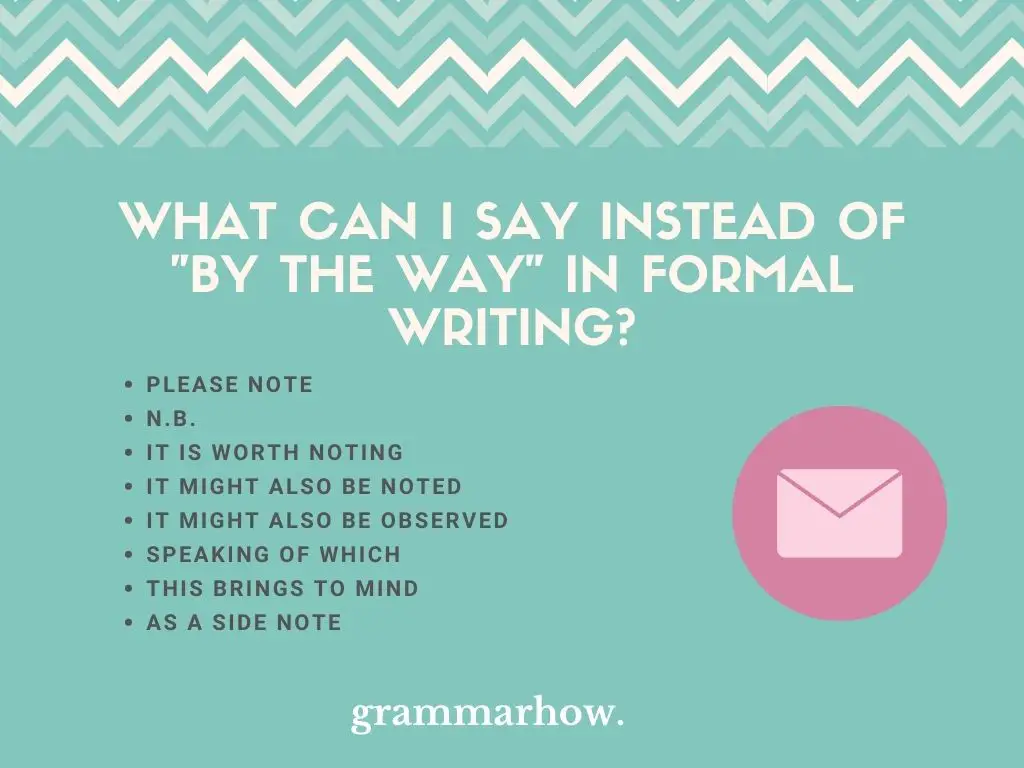“By the way” is usually a phrase that helps to explain further information. It works well if we missed it in the original message or simply remembered it as an afterthought. However, it’s not particularly formal. This article will look at the best formal alternatives to “by the way.”
What Can I Say Instead Of “By The Way” In Formal Writing?
There are plenty of good ways to say “by the way” in formal writing. We’ll look at the following in this article:
- Please note
- N.B.
- It is worth noting
- It might also be noted
- It might also be observed
- Speaking of which
- This brings to mind
- As a side note
The preferred version is “please note” (or “N.B.” if you want to use the abbreviated form). Both are great ways to add extra information that you didn’t feel fitting into the original message. It only works when there is further information to add.
Please Note
“Please note” works better than “by the way” because it encourages people to pay attention. We can use it to add further information to our formal writing, and “please note” will make sure that people are actually reading what they’re seeing.
If someone overlooks a “please note” message, that’s because they were not paying attention. This is usually a sign that someone is not taking their job seriously.
For the most part, “please note” messages will never be overlooked. It helps us to establish where the important messages are in our formal emails, letters, or documents.
We can use this phrase as follows:
- Please note that I will not be able to take part in this meeting.
- Please note that someone will be along shortly to discuss this matter further.
- Please note that everyone in the office believes they have been wronged by this.
N.B.
“N.B.” is the abbreviation of “please note.” It means “nota bene” in Latin (“note well”). We use it in the same way when we want to draw someone’s attention to a specific message.
The idea of using this phrase is to encourage someone to physically “note down” the information we provide. This will ensure they do not overlook it. Even though it’s additional information, it is usually still just as important as the rest.
The abbreviation works identically to “please note,” as you will see in the following:
- N.B. Someone is going to have to take the fall for this error, and I’ll make sure to find out who.
- N.B. I do not care about your vacation days, and I expect you to be back in the office first thing tomorrow.
- N.B. There are plenty of other places that offer the same contract as you, but for more money.
It Is Worth Noting
“It is worth noting” is another great way we can highlight the next sentence. It helps us to indicate that something is very important and needs to be paid attention to. Even if it did not feature in the main part of the message, the additional information is still worth reading.
Using a phrase like this often helps people to focus on what comes next. Rather than potentially overlooking it, it gives them a chance to read whatever the important information is, which helps there to be no confusion or issues if they missed it.
You could use “it is worth noting” in the following ways:
- It is worth noting that I will be holding an annual meeting about our performance statistics next week.
- It is worth noting that the CEO will be coming down to visit this branch tomorrow.
- It is worth noting that none of you impressed me in my preliminary inspections.
It Might Also Be Noted
We can use “it might also be noted” to draw attention to the next point we make. It is additional information that holds no overall weight to the formal written piece. However, we still want someone to pay attention to it and make sure they’ve understood the message.
You could use this phrase in the following ways:
- It might also be noted that I will not be able to make it in on Tuesday, which I apologize for in advance.
- It might also be noted that I have forgotten to bring in my project, and I’m really sorry about that.
- It might also be noted that the boss has given us two weeks to figure out what to do next before we make a move.
It Might Also Be Observed
“It might also be observed” is identical to “it might also be noted.” We simply use a different verb to show that someone should pay attention to the following point before we make it.
These examples will help you to make sense of it:
- It might also be observed that Jim was not in the office on Tuesday, even though he claimed he was.
- It might also be observed that someone has been taking the food out of the fridge again.
- It might also be observed that there are plenty of avenues we can go down to ensure our profits stay up.
Speaking Of Which
“Speaking of which” works differently from the ones above. To use it correctly, we must make sure that it only ever relates to the previous sentence. If there is no useful point to add from the previous one, then “speaking of which” is unnecessary.
Incidentally, “speaking of which” is a little more informal than the choices above. It’s still better than “by the way,” but it’s worth keeping that in mind if you choose to use it.
Check out these examples to see it in action:
- I will not be taking on any more staff. Speaking of which, does anyone know when the final interviews take place?
- We have come to our decision this afternoon. Speaking of which, we must schedule another meeting to discuss it.
- You should remain at home for the time being. Speaking of which, how are your children getting on?
This Brings To Mind
“This brings to mind” is another slightly more informal phrase. We only use it when we want to add further information to the previous sentence. It works similarly to “speaking of which,” and it helps us to show that something is important enough to be added.
While the message we add might not be important to the overall writing, it is still important to a specific sentence we wrote previously. That’s why “this brings to mind” can work in some cases formally.
Here are a few examples:
- I will be booking the business trip next week. This brings to mind the fact that we need to find out who will be attending.
- This will be taking place on the 3rd. This brings to mind the matter of how we are going to pay for the scheme.
- You are to be placed on probation for the next four weeks. This brings to mind the issue you raised with me earlier today, which we can discuss.
As A Side Note
“As a side note” works well when you want to add further information quickly to a message. It typically works best when it directly relates to the previous sentence, and we can use it to add information to that specific sentence.
The information we add depends on the context. Usually, the “side note” will add a helpful explanatory remark. The reader might already know this, but it could still be useful if we’re not entirely certain whether the reader understood it.
“As a side note” isn’t always the most formal option, but it’s still much better than “by the way.” It shows that you wanted to add more information to help the reader rather than simply making an afterthought.
Here’s how it looks:
- This meeting has been scheduled for Friday. As a side note, I will not be around on Friday to help with the meeting.
- I have made the appropriate ammends. As a side note, Timothy also gave me a hand, and he should be commended.
- I have chosen to remain impartial on these matters. As a side note, I believe it’s in your best interest to do so as well.
Is It Appropriate To Use “By The Way” In Formal Writing?
Now that we’ve seen all the best alternatives, it’s time to circle back to “by the way” for a second. We should look at whether it’s possible to write at all with formal documents.
“By the way” is not appropriate in formal writing. There are no cases where you should use it, and you should stick to one of the alternatives recommended above. It does not look good in emails, letters, or other formal documents.
If anything, it seems like you weren’t paying enough attention during your writing. If you say “by the way,” it’s almost like you’ve had to add on more information before you finish your writing hastily.
This is not a good look if you want to impress someone formally. So, it’s best to keep “by the way” out of your formal writing repertoire.
You may also like: 10 Better Ways To Say “Like” And “Such As” In Formal Writing
Martin holds a Master’s degree in Finance and International Business. He has six years of experience in professional communication with clients, executives, and colleagues. Furthermore, he has teaching experience from Aarhus University. Martin has been featured as an expert in communication and teaching on Forbes and Shopify. Read more about Martin here.
Filters
Filter synonyms by Letter
A B C D E F I L M N O P Q R S T U W
Filter by Part of speech
adjective
phrase
adverb
phrasal verb
Suggest
If you know synonyms for By the way, then you can share it or put your rating in listed similar words.
Suggest synonym
Menu
By the way Thesaurus
Definitions of By the way
By the way Antonyms
External Links
Other usefull sources with synonyms of this word:
Synonym.tech
Thesaurus.com
Collinsdictionary.com
Wiktionary.org
Photo search results for By the way






Image search results for By the way






Cite this Source
- APA
- MLA
- CMS
Synonyms for By the way. (2016). Retrieved 2023, April 13, from https://thesaurus.plus/synonyms/by_the_way
Synonyms for By the way. N.p., 2016. Web. 13 Apr. 2023. <https://thesaurus.plus/synonyms/by_the_way>.
Synonyms for By the way. 2016. Accessed April 13, 2023. https://thesaurus.plus/synonyms/by_the_way.
-
incidentally
in connection with
-
by the bye
incidentally
in connection with
-
parenthetically
in connection with
-
by the by
incidentally
-
in passing
incidentally
in connection with
-
apropos
-
casually
incidentally
-
en passant
incidentally
-
off-hand
incidentally
-
accidentally
-
while on the subject
in connection with
-
speaking of
in connection with
-
in parenthesis
-
parenthetical
-
incidental
-
aside
-
accidental
-
episodic
-
relating to
-
with reference to
-
apart from
-
as to
-
in as much as
-
on the part of
-
subordinate
-
bracketed
-
as a by-product
-
remotely
-
occasional
-
unexpectedly
For more similar words, try By the way on Thesaurus.plus dictionary
- apart from
- as to
- aside
- by the bye
- in as much as
- in passing
- incidentally
- on the part of
- parenthetically
- relating to
- speaking of
- while on the subject
- with reference to
- breezy
- casual
- chance
- incidental
- offhand
- random
- supervenient
Roget’s 21st Century Thesaurus, Third Edition Copyright © 2013 by the Philip Lief Group.
On this page you’ll find 22 synonyms, antonyms, and words related to by the way, such as: apart from, aside, as to, by the bye, in as much as, and incidentally.
TRY USING by the way
See how your sentence looks with different synonyms.
How to use by the way in a sentence
By-the-way, I suppose all these people wore pumps and white kid gloves all right?
HAPPY DAYSALAN ALEXANDER MILNE
We were given about seven hours to cover 400 miles—the fastest percentage, by-the-way, on the whole run.
THE NERVE OF FOLEYFRANK H. SPEARMAN
By-the-way, everybody I talked with to-day about leaving said, ‘What’s Lohr going to do with that girl?’
OTHER MAIN-TRAVELLED ROADSHAMLIN GARLAND
SYNONYM OF THE DAY
OCTOBER 26, 1985
WORDS RELATED TO BY THE WAY
- accidentally
- as a by-product
- as side effect
- by the bye
- by the way
- casually
- fortuitously
- in passing
- in related manner
- not by design
- obiter
- parenthetically
- remotely
- subordinately
- unexpectedly
- bracketed
- by the way
- episodic
- explanatory
- extraneous
- extrinsic
- in parenthesis
- incidental
- inserted
- intermediate
- interposed
- qualifying
- related
- subordinate
Roget’s 21st Century Thesaurus, Third Edition Copyright © 2013 by the Philip Lief Group.
Прочтение займет примерно: < 1 мин.
Употребление
Выражение By the way употребляется, чтобы добавить какую-то информацию, которая ранее не обсуждалась и не являлась частью разговора. Также By the way может употребляться, чтобы полностью сменить тему разговора.
Перевод
На русский язык выражение By the way обычно переводится как: к слову; тем не менее; впрочем; к слову сказать; кстати; между прочим и т.д.
Примеры
I was talking to Rayan yesterday. Oh, by the way, he sends you his regards. He is looking for a house to buy.
Я вчера разговаривал с Райяном. Кстати, он передает тебе привет. Он подыскивает себе дом.It’s a wonderful day, isn’t it? By the way, my name is Steven.
Прекрасный день, не так ли? Кстати, меня зовут Стивен.
Синонимы
Синонимичное значение имеет incidentally.
Полезная статья?! Ставьте Like
Like
8
Вы можете написать нам комментарий:
Нашли описку или у вас есть дополнение, напишите нам.




